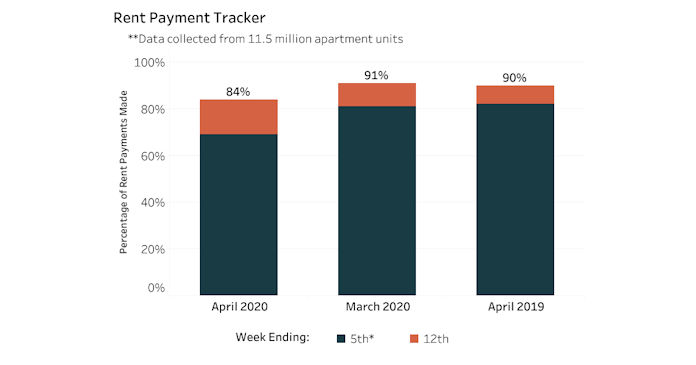As part of its project to track rent payments being made during the corona virus shutdown, NMHC reported that an additional 15 percent of renters made at least a partial payment of their April rent during the second week of the month. This brings the portion of renters who have at least partially paid their rent in April to 84 percent. This compares with 90 percent of renters who had made a rent payment during the same time in April of last year and 91 percent who had made a rent payment at this point in March 2020.
During the webcast that accompanied the release of this data, the general sense was relief that most renters were meeting their obligations to pay their rent. They are paying despite the fact that waivers of late fees and bans on evictions have diminished the incentives to pay the rent on time. Another factor that may impact payments is that closures of leasing offices may have disrupted the method by which many people pay rent, leading to delays.
While the NMHC rent tracker focuses on a single national payment number, there are variations within sub-markets. Although payment compliance for class A properties is generally running about 5 percent ahead of that for class C properties, Greg Willett of RealPage suggested that this may be due to employment vulnerabilities in regions with concentrations of class C units. In particular, regions with a high concentration of jobs in the tourism, restaurant and hospitality fields have been hard hit with job losses and this is reflected in residents’ ability to pay their bills.
A bright spot is senior housing where payment compliance is running at 99 percent.
Looking ahead
Hope was expressed that the arrival of the personal stimulus checks and the receipt of enhanced unemployment benefits will improve residents’ ability to pay so that rent payment performance will not diminish in May. On the other hand, Jeff Adler of Yardi Matrix expressed concern that it may take many months for jobs to return in the hard-hit sectors of the economy. This could lead to problems down the road if government support payments to displaced workers run out before jobs for them open up again.
Elizabeth Francisco of ResMan expressed a concern that the eviction ban may allow some residents to accumulate sizable delinquency balances. Given that margins for operators are smaller than many policy makers and residents realize, these delinquencies could cause major hits to operators’ bottom lines.
The NMHC project enlists the support of five major providers of property management system software to provide data on the units being managed by their software. These companies are Entrata, MRI, RealPage, ResMan and Yardi Matrix. In total, 11.5 million units are covered by their systems. While this represents around half of the rental apartments in the county, these are the more professionally managed units. Small operators are not generally covered in this survey and their experience may be significantly different.
The NMHC rent tracker page may be found here.












